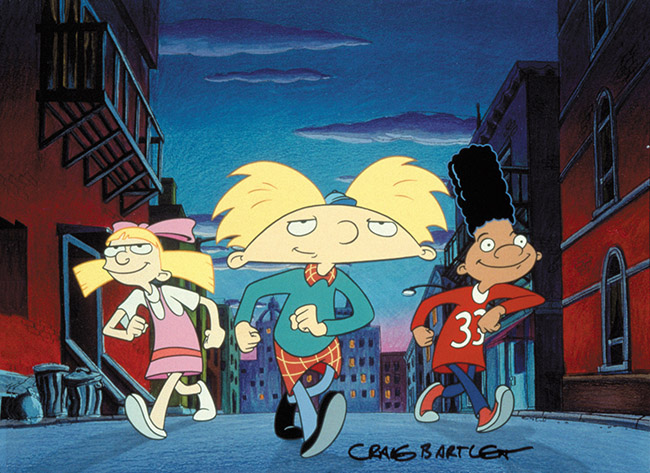
Arnold, Helga and Gerald, protagonists of 90s Nicktoon Hey Arnold!
A question that’s unique but essential to our generation is: Were you a Nickelodeon kid or a Cartoon Network kid?
For me, it was easily Nick. Spongebob Squarepants, Fairly Oddparents, Jimmy Neutron and Rugrats all found that perfect balance between goofy childish humor and meaningful life lessons.
But the show that meant the most to me wasn’t about a fry cook sponge or talking babies. It wasn’t about a boy genius or wish-granting fairies. It was Hey Arnold! — a show that hit home the hardest because it told ordinary stories about ordinary kids with extraordinary emotion.
You may be confused — wasn’t Hey Arnold! just a typically silly Nicktoon? Think again. Think back to the episodes you remember the most — Pigeon Man, Stoop Kid, the Christmas special — these were powerful, moving stories presented in a serious manner. One episode, “Helga on the Couch,” spent nearly the entire 22 minutes observing Helga Pataki’s therapy session with the school psychologist. It showed flashbacks of her childhood, of her terrible parents who blatantly favored her older sister, forgot her name and made her walk to preschool on her own in the pouring rain. None of this is told with any lightheartedness. Even now, as a college student, it’s tough to watch.
With its occasional use of episodes that told one, often serious, story over the course of a half-hour (rather than splitting it into two segments, as is common for cartoons), Hey Arnold! might be the only kids’ TV show that could legitimately be considered a drama.
The emotional and serious nature of the show is why it resonated so strongly with so many. Arnold! treated its young audience with a respect that most shows didn’t. There was certainly humor in each and every episode (Brainy’s heavy breathing instantly comes to mind). But the most important character — the show’s namesake — wasn’t himself funny.
Arnold, and even his best friend Gerald, are not constantly cracking jokes or performing slapstick comedy routines. They’re mostly just normal kids — taking in and reacting to the wacky people or situations around them.
In this way, Arnold is the closest thing we have to a modern-day Charlie Brown. (The only other character that comes to mind is Woody from Toy Story, but he’s in a league of his own at this point.) His life is depressing in a lot of ways — he doesn’t have either of his parents, the girl who loves him does nothing but bully and tease him and he gets caught in the middle of seeimingly every possible bad situation. When Mr. Simmons, Arnold’s meek fourth grade teacher, takes over P.S. 118 as principal and the school descends into chaos, Arnold is the guy who has to calm him down while he sheepishly hides under a desk. He’s the adult in the room. And it never feels fake or forced. Arnold isn’t some superhuman adult in a child’s body — he’s just a mature, caring, thoughtful kid.
Other shows simply did not have the emotional depth and complexity that Hey Arnold! had on a regular basis. One Christmas special shows flashbacks of Mr. Hyunh being separated from his daughter in the Vietnam War. “Gerald Moves Out” follows Gerald as he leaves his family and home and moves in to Arnold’s boarding house, only to realize how much he loves and cares about his family. “Pigeon Man” tells the story of a misunderstood man who abandons society to become a heroic, deranged half-bird creature. In his closing speech before literally flying into the sunset, the Pigeon Man explains his predicament: “You see, Arnold, it’s time for me to leave here. Some people are meant to be with people. And others, like me, are just … different.”
Hey Arnold! didn’t just entertain. It inspired and taught. That’s why it has more lasting power than our generation’s other childhood TV memories. It focused on moral dilemmas and psychological questions, with a main character who could be admired as a true role model — Arnold was always the most mature, level-headed kid in the room. Compared to other cartoons, Hey Arnold! was just…different.
offitzer@umdbk.com



